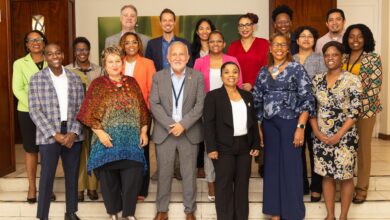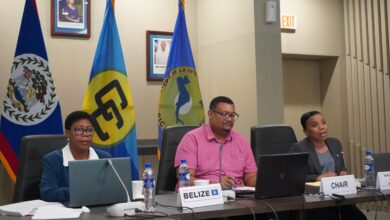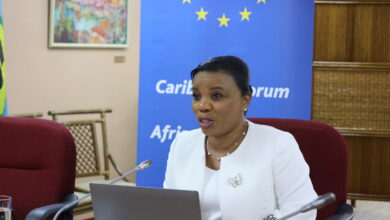The critical importance of Drug Observatories (DOs) was underscored at the Opening of the Regional Seminar for Drug Observatories in the Caribbean on 4 April 2018, in Georgetown, Guyana. The importance of international cooperation and synergies in the fight against illicit drugs was emphasized also to the gathering mainly of Caribbean Community (CARICOM) practitioners, policy makers and researchers in the field.
Beverly Reynolds, Coordinator for Health and Human Development, CARICOM Secretariat, said Drug Observatories are expected to “provide a more accurate picture of the drugs situation” in a country. “They help to identify emerging trends at an early stage and they provide decision-makers with the evidence needed for designing and evaluating appropriate strategies…”.
.jpg)
Chargé d’Affaires for the United States Embassy in Guyana, Terry Steers-Gonzalez, reiterated his government’s continued support for DOs around the world, noting their important functions to collect monitor, analyse and treat data and to disseminate information to local, regional and international stakeholders to inform decision making.
“Their roles are “vital in the region’s fight against illicit drug use and trafficking and without which ‘our efforts are just a shot in the dark…”, the US representative said.
Feature Speaker, Guyana’s Minister for Public Security, Hon. Khemraj Ramjattan challenged the gathering on the output of the seminar.
“If there is one thing that I would like to see coming out of this seminar is your emphasis on evidence based data driven policies and practices”, he said.
The minister likened drug observatories to the “brains of the society”, tasked with coming up with the relevant evidence based solutions, policies and practices. In order to do, he noted, Observatories must ask the correct corrections.
“The correct questions in relation to matters of drugs sometimes lead us, for example, to whether we should legalise the activity or decriminalize the activity…” he said. The minister noted that international cooperation was vital and one of the bases for working together to ensure that the scourge of drugs was extirpated from our societies.
The Organisation of American States (OAS) representative, Jean Ricot Dormeus reiterated the case for international cooperation remarking that the seminar resulted “from a synergy among several entities: the OAS, CARICOM, the European Union and the United States of America”.
“We need to understand more clearly the threats to our societies and economies. We need to sharpen our tools to counter these threats effectively. We need to craft policies that curb crime and violence. We know that the abuse and trafficking of drugs fuel crime and violence, and at the same time destroy our youth, seek to corrupt our civil servants and politicians, and derail the forward movement of our economies”….This synergy signals to me that no entity can do it alone; unity does generate force”.
Mr. Dormeus commended the newly established National anti-Narcotics Agency (NANA), for being instrumental in the preparation of the meeting, which he said “shows already great signs of vibrancy”.
The Opening ceremony was chaired by Major General Atherly, Director of NANA. The two day seminar is being held in collaboration with the Government of Guyana and the Organisation of American States Inter American Drug Abuse Control Commission (OAS/CICAD). The
It aims to strengthen the capacity of representatives to gather, analyse and report on drug-related information and to enable the development of evidence-based drug policies and programmes. It is an activity of the response under the Drug Demand Reduction (DDR) component of the Tenth European Development Fund (EDF) Crime and Security Programme between the European Union and CARIFORUM.
Tags: Tenth European Development Fund (EDF); regional seminar for national drug observatories in the Caribbean; illicit trafficking in drugs, crime and violence; CARIFORUM; CARICOM; CICAD, EU, crime and violence; substance abuse; Organisation of American States; National anti-Narcotics Agency, Guyana; drug demand reduction; substance abuse and addition; United States Embassy in Guyana
AP.






